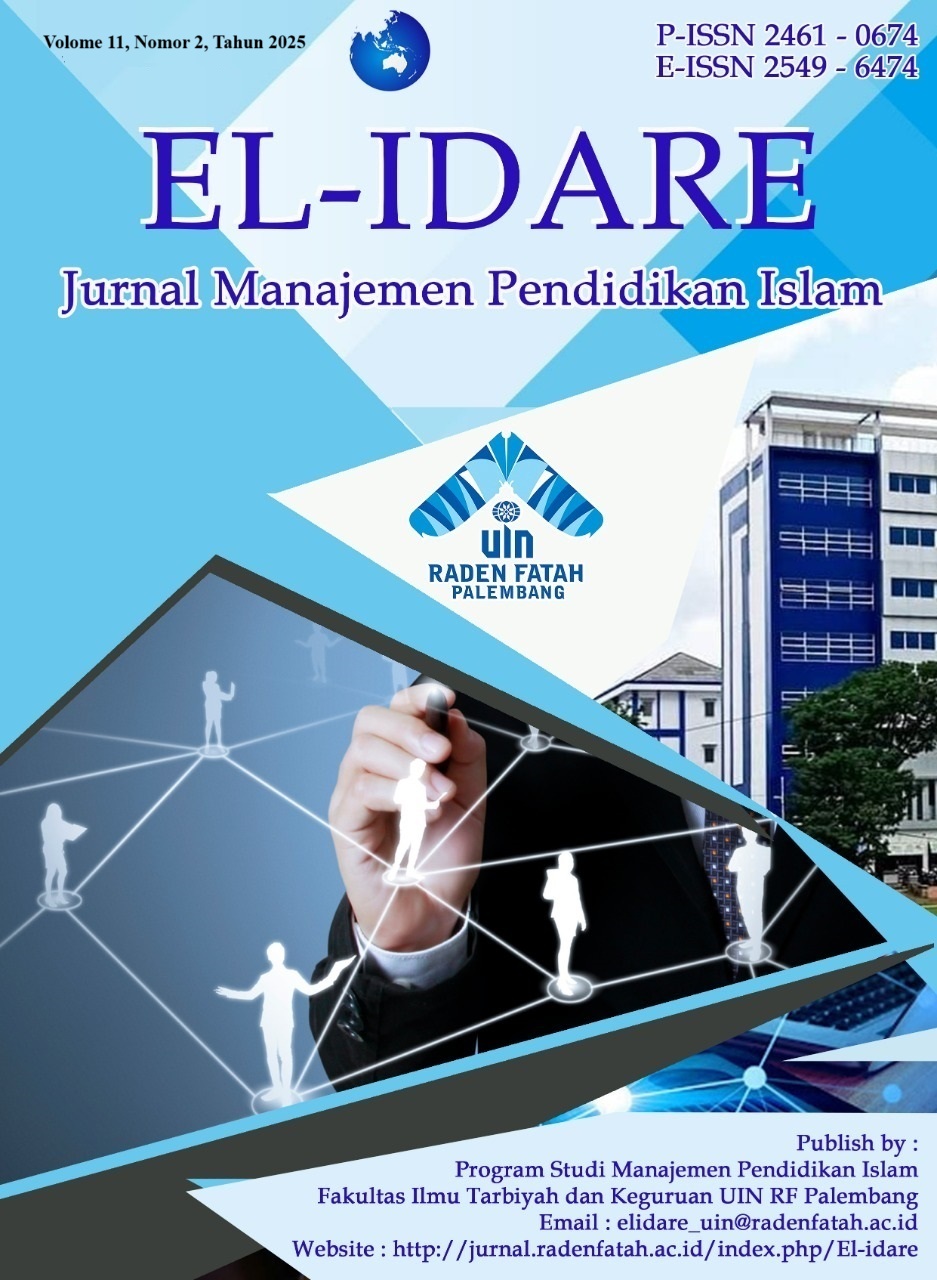The Implementation of the Distributive Supervision Model in Enhancing Teacher Professionalism at MTsS Ulumuddin, Lhokseumawe City
Main Article Content
Abstract
This study aims to describe the implementation of the distributive supervision model and its contribution to enhancing teacher professionalism at MTsS Ulumuddin, Lhokseumawe City. The main informants consist of the Madrasah Supervisor, Principal, Vice Principal for Curriculum Affairs, and certified teachers. Data were collected through non-participant observation, structured interviews, and documentation of relevant activity records. Data analysis was conducted through several stages, including data reduction, data presentation, and conclusion drawing, with continuous verification to ensure result credibility. The findings reveal that the implementation of distributive supervision involves three main stages: joint planning, collaborative implementation, and evaluation with reflection. In the planning stage, the active involvement of all parties fosters a sense of ownership and alignment of supervision goals. The implementation stage emphasizes collaboration between supervisors and teachers through classroom observation, reflective discussions, and the provision of constructive feedback. Meanwhile, the evaluation and reflection stage serves as a medium for continuous professional learning, followed by follow-up activities such as training and mentoring. Overall, distributive supervision at MTsS Ulumuddin plays a significant role in improving teachers’ pedagogical competence, professionalism, and ethical conduct. This model functions not merely as a control mechanism but as a collaborative developmental process that promotes a professional culture and sustainable improvement in learning quality.
Article Details

This work is licensed under a Creative Commons Attribution-NonCommercial-ShareAlike 4.0 International License.
The requirements that must be met by the author are as follows: 1.The author saves the copyright and gives the journal simultaneously with the license under Creative Commons Attribution License which permits other people to share the work by stating that it is firstly published in this journal. 2.The author can post their work in an institutional repository or publish it in a book by by stating that it is firstly published in this journal. 3.The author is allowed to post their work online (for instance, in an institutional repository or their own website) before and during the process of delivery. (see Open Access Effect).
How to Cite
References
Alptekin, Z., & Taneri, A. (2025). Technology Integration in Pedagogical Processes : Digital Competence and Teaching Practices of Primary School Teachers in Turkey. Alptekin and Taneri Discover Education, 4(351), 1–22. https://doi.org/10.1007/s44217-025-00646-9
Ayuningrum, & Atikah, C. (2024). Transformasi Supervisi Pendidikan Di Era Teknologi Digital Pada Kurikulum Merdeka. Pendas: Jurnal Ilmiah Pendidikan Dasar, 9(4), 873–879. https://doi.org/10.23969/jp.v9i4.19045
Creswell, J. W., & Poth, C. N. (2017). Qualitative Inquiry and Research Design: Choosing Among Five Approaches. California: Sage Publications.
Fitriyah, S. N., Sutadji, E., & Dewi, R. S. I. (2025). Professionalism and Technological Pedagogical and Content Knowledge Skills of Primary School Teacher. Research and Development in Education (RaDEn), 5(1), 209–227. https://doi.org/10.22219/raden.v5i1.37594
Geerhand, A., Hartini, A. F., & Rosdiana. (2024). Konsep Karakteristik Profesional Guru Di Abad 21. JPNM: Jurnal Pustaka Nusantara Multidisiplin, 2(2), 1–6. https://doi.org/10.59945/jpnm.v2i2.181
Hajar, I., & Yusrianti, S. (2024). Optimalisasi Model Supervisi Distributif Untuk Meningkatkan Profesionalisme Guru Di Mts Al-Muslim. Idaarah: Jurnal Manajemen Pendidikan, 8(2), 170–178. https://doi.org/ 10.24252/idaarah.v8i2.46339
He, P., Guo, F., & Abazie, G. A. (2024). School Principals’ Instructional Leadership as a Predictor of Teacher’s Professional Development. Asian-Pacific Journal of Second and Foreign Language Education, 9(1), 1–18. https://doi.org/10.1186/s40862-024-00290-0
Hidayat, Jalil, D. M., Wulansari, D., & Rusmiati, E. (2022). Manajemen Supervisi Pendidikan. Sustainable.
Isriyati, Suminar, T., & Formen, A. (2024). The Influence of Principal ’ s Academic Supervision on Teachers ’ Professionalism Teaching Motivation as a Mediator for Kindergarten Teachers. Indonesian Journal of Early Childhood Education Studies (IJECES), 13(1), 21–29. https://doi.org/10.15294/ijeces.v13i1.69877
Mahidin, M. (2022). Etika Guru Sebagai Landasan Pada Peningkatan Profesionalisme Dan Mutu Satuan Pendidikan: Studi Kasus Di Mts Laboratorium UIN Medan. Al-Mursyid: Jurnal Ikatan Alumni Bimbingan …, 4(2), 1–10. https://doi.org/10.30829/mrs.v4i2.2359
Mardiah, A., & Fernandes, R. (2025). Adaptasi Guru SMA Negeri 6 Kerinci Dalam Mengimplementasikan Pembelajaran Berdiferensiasi Kurikulum Merdeka. Naradidik: Journal of Education and Pedagogy, 4(1), 146–157. https://doi.org/10.24036/nara.v4i1.313
Miles, M. B., Huberman, A. M., & Saldana, J. (2014). Qualitative Data Analysis, A Methods Sourcebook, Edition 3, Terjemahan Tjetjep Rohindi Rohidi, UI-Press. USA: Sage Publications.
Novianti, Satyawati, S. T., & Wahyudi. (2024). Analysis of the Role of Educational Supervision in Enhancing Teacher Professionalism. Journal of Studies in Academic, Humanities, Research, and Innovation, 1(2), 117–129. https://doi.org/10.71305/sahri.v1i2.145
Pardi, P. U. S., & Jamilus. (2025). Perencanaan Supervisi Akademik. Jurnal Pendidikan Kreativitas Pembelajaran, 7(3), 7(3), 104–114.
Patton, M. Q. (2015). Metode Evaluasi Kualitatif. Yogyakarta: Pustaka Belajar.
Pratiwi, S. D., Widodo, & Hidayati, D. (2025). Peran Pengembangan Keprofesian Berkelanjutan (PKB) dalam Meningkatkan Komitmen Kerja Guru. Jurnal Kepemimpinan & Pengurusan Sekolah, 10(1), 51–59. https://doi.org/10.34125/jkps.v10i1.376
Rahayu, R., Iskandar, S., & Kurniawan, D. T. (2023). Karakteristik Keterampilan Guru Abad 21. Caruban: Jurnal Ilmiah Ilmu Pendidikan Dasar, 6(1), 89–102. https://doi.org/10.33603/caruban.v6i1.8018
Rahmadani, L., Muspawi, M., & Rahman, K. A. (2025). Teknik Observasi, Evaluasi, Dan Umpan Balik Dalam Supervisi Pendidikan. JURNAL MADINASIKA: Manajemen Pendidikan dan Keguruan, 6(2), 118–125. https://doi.org/10.31949/madinasika.v6i2.13691
Syahputra, A., Sudadi, & Mufaizin. (2024). Implementation of Clinical Supervision to Enhance Teacher Professionalism at Madrasah. Idarotuna: Journal of Administrative Science, 5(2), 170–183. https://doi.org/10.54471/idarotuna.v5i2.110
Ulum, M. S., Rohmana, W. I. M., & Elvira, M. (2023). Dynamics of Content Knowledge: Learned from Indonesian Arabic Teachers. Education Research International, (1), 1–17. https://doi.org/10.1155/2023/8883362
Vanegas, H. D. O., Cifuentes, Y. de M. S., & Morrás, A. S. (2025). Educational Technology in Teacher Training: A Systematic Review of Competencies, Skills, Models, and Methods. Education Sciences, 15(8), 1–25. https://doi.org/10.3390/educsci15081036
Yin, R. K. (2018). Case Study Research and Applications: Design and Methods. Thousand Oaks: Sage Publications.

